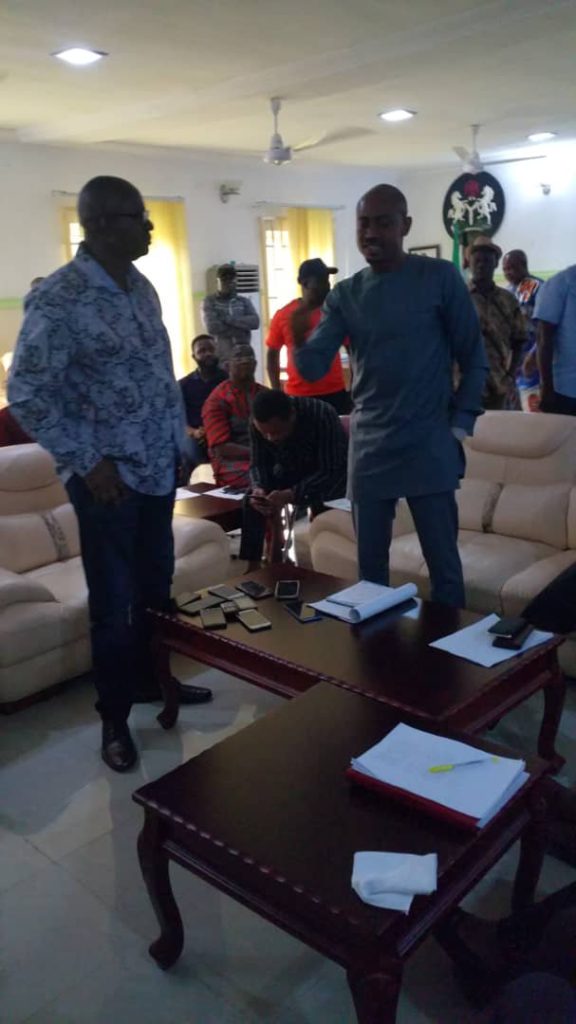June 21, 2019. We had just received word at Policy Alert that some communities in Esit Eket Local Government Area of Akwa Ibom State were protesting alleged failure to deliver on community entitlements by oil and gas companies operating in the area. This sounded like just the community entry opportunity we’d been looking for to onboard these communities into #WetinWeGain, a campaign that familiarizes resource-rich communities with extractive data and mobilises them to use such data to demand accountability from companies and government.
Our team set out immediately for Uquo, Edo, and Ebe Ekpe communities in Esit Eket. The atmosphere was tense when we arrived. Some community members we spoke with explained that the reason for their protest was the failure of Frontier Oil Limited to implement the terms of agreement contained explicitly in the Memorandum of Understanding (MoU) signed between the communities and the company.
Frontier Oil Limited is an indigenous Oil and Gas Exploration and Production Company that was established in 2001 and awarded the Uquo Marginal Field located in Oil Mining License (OML) 13 (onshore, Akwa Ibom) in 2003. Also, Frontier Oil Limited is the operator of a three-company joint venture operating a crude oil evacuation and delivery infrastructure from three marginal fields located in OML 13 and OML 14 to the Exxon Mobil Qua-Iboe crude Oil Terminal.
Our first point of call was the office of the Esit Eket Local Government Chairman, which served as the venue of the meeting between the company and some representatives of the affected communities. The community representatives observed that Frontier Oil had sent in just one representative, Wale Adefila, to the meeting, and that he appeared unprepared for the situation on hand. The Chairman of Esit Eket Local Government Area, Iniobong R. Namnso, expressed displeasure that the company had reneged on nearly all of the commitments made in the MoU with Esit Eket and Eket Local Government Areas. He recounted the commitments to include:
- Payment of Community Development Fund of
N50,000,000 in 2016,N55,000,000 in 2017,N57,750,000 in 2018, andN63,669,375 in 2019 - Unskilled labour recruitment formula comprising 29% for immediate host community and 61% for other host communities.
- Semi-skilled labour recruitment formula comprising 22% for immediate host community and 48% for other host communities.
- Skilled labour recruitment formula comprising of 19% for immediate host community and 41% for other host communities.
- Professional labour recruitment formula comprising of 10% for immediate host community and 41% for other host communities.
- Annual award of 20% of total annual Community Development Funds to post-secondary school scholarships.
- Annual award of 20% of total annual Community Development Funds to train and retrain teachers, provide science equipment, equip libraries, and renovate schools.
- Annual award of 10% of total annual Community Development Funds to execute skill acquisition programmes.
- Annual award of 10% of total annual Community Development Funds to implement micro-credit schemes.
In response to the allegations, Wale Adefila testified that Frontier Oil couldn’t meet up with the terms in the MoU because the company fell short in realization of its fiscal assumptions. Wale Adefila went further to state that the price volatility of oil and gas and a huge shortfall in expected production volume made it impossible for the Frontier Oil to fulfill the said commitments. Eventually, the meeting was adjourned to a later date to enable Frontier Oil put its house in order and setup a formidable team to represent it in the next meeting.
After the meeting, Policy Alert team proceeded to three of the sites where the protest was held. The first site visited was the Frontier Oil Uquo Well-head. At this site, youths barricading the entrance to the yard housing the well-head said that they will only vacate the location of the protest if Frontier Oil follows through on the commitments made in the MoU. Subsequently, we advanced to the operational office of Frontier Oil situated at Edo community. The youths of Edo had also cordoned of the Frontier Oil facility stationed in their domain. Like the Uquo youths, they too would not budge. The situation wasn’t any different at Ebe Ekpe, the last community we visited. The entire operations of Frontier Oil Limited there had been shut down. In addition to demanding that Frontier Oil desist from breaching the pact made with the community, Ebe Ekpe demanded a stop to the ongoing harassment of farmers in the community by military personnel guarding the company’s facilities. They claimed that the soldiers were obstructing farmers from gaining access to their farmlands. The land grabbing and direct attack on local livelihoods introduces an additional dimension to the existing crisis in these communities.
Why should resource rich communities continue to play host to extractive companies and their activities if they cannot benefit even marginally from the resources they own and if their livelihoods are continually destroyed? Are Frontier’s footprints in Esit Eket not turning the area into a risky frontier for its people? Beyond the raw angst, however, majority of the people appeared interested in using knowledge to constructive engage with government and the companies. Note to self: There’s work to be done here!


